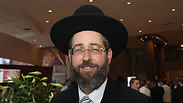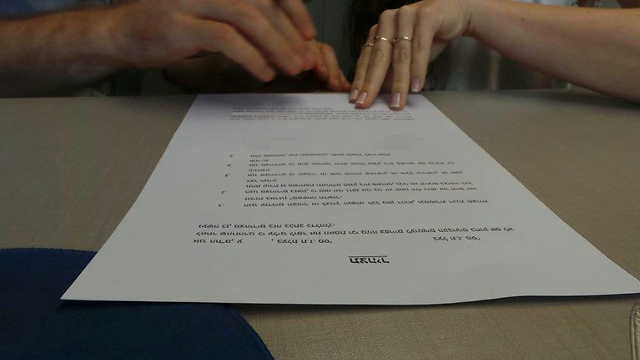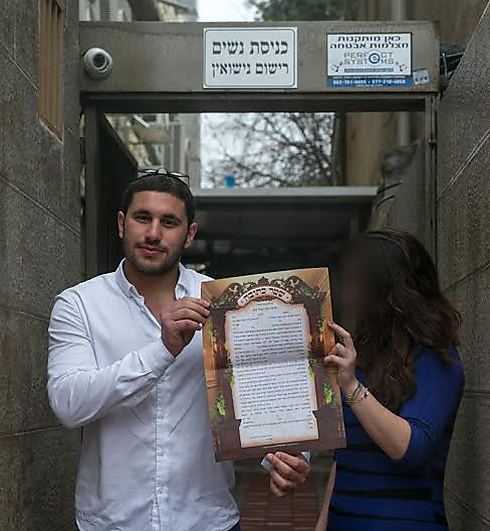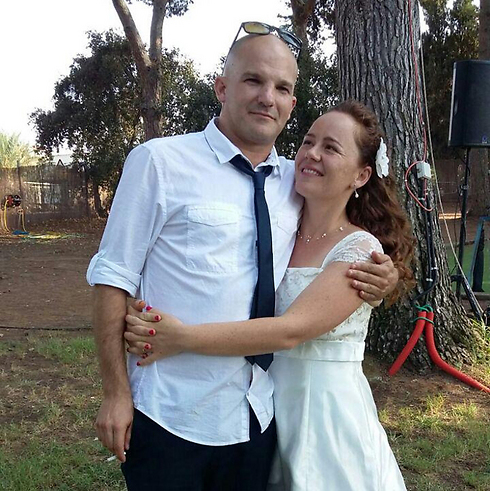
Marriage... without the Rabbinate
In order to get married in Israel, one has to go through the arduous and, according to many, demeaning process of getting confirmed as Jewish. In order to get around this, many couples are looking for another way - and they are finding it in surprisingly lax ultra-Orthodox religious courts. A Ynet reporter went almost all the way throught the marriage process in one of these courts, and discovered it's surprisingly simple.
"When we got to the office of the Chief Rabbinate to register, they told us that would need to prove my wife's Judaism," said A. "They requested marriage certificates from her parents, the approval from a rabbi the Rabbinate recognizes in the United States, and other forms of proof. When I told my friend about all of this, he said, 'what, are you crazy? Just go register with the ultra-Orthodox, they're really lax. Indeed, we went there and within five minutes got a marriage certificate, without investigations and without harassment."
More than a few stories like this were reported to Ynet in the last several months. We were skeptical at first. It doesn't make sense for the religious courts, which are known for being careful and strict, to allow anyone who wants to get married to do so, without even checking that they are actually Jewish. Well, it turns out that A.'s allegation is very true, and that the reality is even more extreme.
Along with a man learning in a seminary who agreed to play along and pretend he was marrying me, the I went through the entire marriage registration process at the Eda Haredi Religious courts in Jerusalem, one of three ultra-Orthodox courts that have the authority to issue marriage licenses in Israel.
However, the word "process" might be a mistake in describing how the certificate was obtained. We called, we arrived, produced documents that weren't exactly standard, obtained a K'tuba (Jewish marriage contract), and all that was left was to call and report we were officially married.
"We'll register you with the Interior and Religious Services Ministries," the marriage registrar said.
The claims, of course, are not directed only at the religious courts.
In the last couple of years the Rabbinate announced a camaign against the Tzohar group, which seeks to enable couples to marry according to Jewish law, but in a Conservative and Reform setting. It also helps people who want to marry be recognized as Jewish. They assist in getting any couple married by any rabbi in any city.
The Rabbinate – which is under the control of the ultra-Orthodox – says, "if everyone did what they want (in regards to religious law), the Jewish state is gone."
Regarding the Reform and Conservative Jewish movements, of course, there's nothing to discuss. According to the Rabbinate, they are invalid. And civil marriages, as is already known, are against the law. The only way to get a civil marriage is to fly out of the country, pay a huge sum of money for a wedding outside of the country, and then return and register in Israel, where the civil marriage, as long as it is performed outside the country, is recognized.
In practice it turns out, even the religious courts of the ultra-Orthodox Eda Haredi and Belz Hassidim perform civil unions a lot more than the liberal rabbis at Tzohar.
This raises the question: if the strictest of rabbis approve of civil marriages, why don't they let other groups perform marriages in the same manner? The answer is simple – money. It costs NIS 700 to be registered as married (or NIS 420 for yeshiva students). However, contrary to the Rabbinate, the service doesn't include the bureaucracy, the clerks, or the investigations – only registration.
Bridal counselor Leah Shnirer
My first step was calling the Edah Haredi religious courts in order to register the "marriage," and was greeted by an automated system in Yiddish. I was only able to get to Hebrew by pressing the number two. Afterwards, the secretary who answered the phone calmly explained what was needed in order to register a marriage: Single certificate, parents' marriage certificate (proof of Judaism), certificate from a bridal counselor, and for a discount, a certificate that the husband studies at a yeshiva.The next step was to find a volunteer. Shlomo, a yeshiva student, kindly agreed to join, and we decided to go through the entire process, but stop at the last second, before he finds himself listed as "married" in the
Interior Ministry.
We entered the registry offices on 26 Strauss Street in Jerusalem, and turned in the papers requested of us. The registrar casually flipped through them.
"Your singles certificate isn't good," he said to Shlomo. "There isn't a professional stamp or logo certified by a rabbi."
The registrar then too kmy certificate from the bridal counselor and said "here there is a logo, it's printed, and I see that it is real. What you brought, one can make at home."
There was only one problem – the bridal counselor certificate was completely fake. The name Leah Shnirer was chosen because it was a name unlikely to arouse suspicion amongst the registrar. No one bothered to check if Leah Shnirer was a real person.
Although Shlomo's certificate wasn't correct, the registrar registered us as married. As he was filling out the details, he was also answering phone calls, and writing everything down – names of rabbis who performed the weddings, the names of the bride and the groom, the names of the bridal counselors. Everything happened over the phone, without knowing if he was talking to an ultra-Orthodox, orthodox, or secular couple, the secular courts deals with everyone as long as it deals with marriage. And also money.
It turns out, a lot of people – national religious, modern orthodox, and even secular people – are coming to this ultra-Orthodox religious court to get married, and are doing it in spite of the Rabbinate.
"Why should I go through a nightmare at the Rabbinate?" one clearly secular future groom said in the Edah Haredi religious magistrate building. "If I can do it easily here, without them yelling at me and checking how Jewish my wife is, and why the conversion of her grandmother was this or that, or if she followed Jewish law during her menstrual period."
Why not have a civil union?
"Our families are religious, and we don't want to hurt them. That’s it."
The amount of couples is infinite, and floods the registrar's office. In the last few years, the word has spread that anyone who wants to avoid the Rabbinate, and doesn't want any connection to the agency (even Tzohar marries through the Rabbinate) should register at one of the ultra-Orthodox religious magistrates.
"Who is the rabbi who will preside over the wedding?" the registrar asked Shlomo. "Rabbi Shalom Wazner from Beitar Illit," he replied confidently.
"After the wedding," the registrar said, "even in the days of the seven blessings, call us and send us the names of the witnesses. Afterwards, wait four days and call to ask if the certificate is ready, we say 'amen,' and then you come with the Ktuba to take your marriage licenses."
The reporter asked if they needed a special certificate from the rabbi that he performed the ceremony.
"You don’t need anything," the registrar replied. "Here, this is a receipt that you paid."
The reporter then asked if that was the certificate to get married, to which the registrar replied in the affirmative.
The couples are satisfied

It was only last week that Channel 10's Yair Sharki did an expose on the deliberate abuse by the Rabbinate of hundreds of couples who were supposed to get married by the Tzohar organization – claims that the groom was a bastard and the bride wasn't Jewish. The question arises, for what reason?
One may find that the behavior of the ultra-Orthodox religious courts is liberal but not ideal, especially for those ultra-Orthodox marriages of people who aren't getting married according to Jewish religious law or those who aren't certifiably Jewish. The bottom line: all of the couples leave satisfied and happy with the process, and not distanced from their Judaism, something that sometimes happens after meeting with the Rabbinate, which is also controlled by the ultra-Orthodox, and which fights with the national religious sector.
"Theres no doubt that today, in Israel, the process for registering marriages has turned into something threatening to many couples," Rabbi Shaul Farver of the Itim (Rights of Jews for All Time) organization said. "Instead of using this opportunity to show the beautiful side of Judaism, the Rabbinate has turned into detectives and interrogators, and has created distrust between the two sides. We need to aspire – and we are working on this every day – that this significant meeting point with Judaism in the life of the young couples will be a positive memory which they will take with them their whole lives. I'm sorry to say it, but today, a lot of couples choose a wedding where they can get through the religious aspect as pain-free as possible. A lot of the blame lies with the Rabbinate."
Today, Itim is trying to push through a law that will decentralize the authority regarding bridal counseling, and also have a discourse on the subject of the investigation of whether one is truly Jewish or not. But experience teaches that this will not be easy, like anything that gives power and votes to the ultra-Orthodox.












